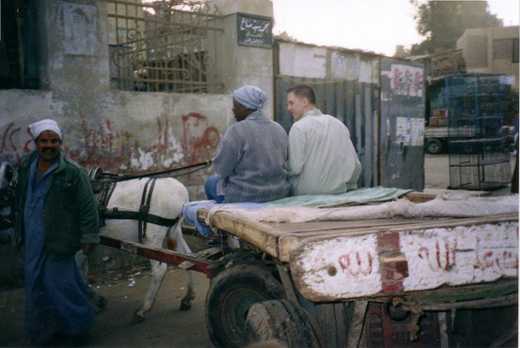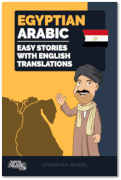Learning Arabic? Here Are 5 Books That I Highly Recommend You Own
 Written byHubert Nagel
Written byHubert Nagel- Read time9 mins
- Comments124

Note: We’ve put together a huge resource for learning Arabic which you might find useful. Click here.

NEW: Are you learning Egyptian Arabic? We just released an excellent new book called Egyptian Arabic: Easy Stories With English Translations. It’s aimed at high-beginners to low-intermediate learners and a great way to build vocabulary and comprehension.
It’s on Amazon here.
You’ll hear me talk about the Arabic language a lot on this site.
Although I regard myself as a veteran language learner of many languages and a polyglot, I can say with the utmost confidence and pride that Arabic is something I’m an expert in with over a decade of experience, both linguistic and cultural.
I’m referring to the Egyptian dialect and Modern Standard specifically (in some ways they can be regarded as two separate languages given their differences).
I don’t know if it’s because I started learning it as a teenager or just because of the length of time I’ve spent on it but Arabic is the only language I don’t have to spend time activating if I don’t use it for a long period of time.
If I was going to spend time in France for example, I’d probably need to spend a short period of time turning French on by going over material and so on because it tends to go into hibernation if I don’t use it.
With Arabic it’s not the case.
I can go long periods of time without talking to anybody or hearing it and it’s just always there for instant retrieval as soon as I need it.
This is not to say that I’m perfect at the language by any means – I make mistakes all the time which I’m happy to admit – but this language has become so part of me now that it’s core to my identity as a person.
I like to think of myself as a bilingual kid who started late.
Anyway I’ll share my story of how and why I came to learn Arabic in the near future but for now I wanted to recommend a few excellent books to people who are wanting to learn Arabic.
If you’re trying to decide on another language but haven’t made up your mind as to which one then consider Arabic! It’ll be one of the most rewarding decisions you ever make.
Arabic Language Books That You Should Own
Note FYI: The links here are affiliate links which means that a tiny fraction of any purchase will help keep this site up and running.
Another note: I haven’t mentioned any books here to do with learning the Arabic alphabet. Frankly I don’t recommend you spend money on alphabet books because a simple Google search will give you what you need for this.
I’ve had arguments in language learning forums with people adamant that they need to spend money on alphabet books like Alif Baa’.
*Please take it from a guy who learned how to read Arabic in 1 day using free internet sites – you don’t need to waste your money on alphabet books. Arabic is not as hard to read as it looks!*
If music’s your thing, there’s a downloadable listening program that I often recommend to people called Rapid Arabic (for Modern Standard Arabic).
It’s a unique (research-based) concept that teaches the language over a music backing track with carefully placed repetition and it’s only a few dollars. The first volume is really easy and suited for absolute beginners and the second volume gets into the meatier, higher level content.
You can listen to a sample of it here.
Also if you’d like a recommendation for an online program to learn Arabic rather than just books, I recommend these three:
Rocket Arabic for Egyptian (very comprehensive resource but audio only). I reviewed its content here.
ArabicPod101 for Moroccan, Egyptian and Modern Standard Arabic. I reviewed it here.
For video and audio content – TalkInArabic.com which covers 8 spoken dialects of Arabic (including our Essential Arabic Verb Packs).
1. The Kalimni ‘Arabi Series
These are, in my opinion, the best books for learning Arabic in existence.
I bought the higher advanced Kalimni ‘Arabi Fi Kull Haaga (Speak Arabic To Me In Everything) book last year and I swear to God (wallahi), this is the most outstanding and useful book that I’ve ever owned (I have two big bookcases full of hundreds of books and dozens on Arabic and this is my favourite).
I can not stress to you enough how good this series is.
They come with CD’s and DVD’s full of interesting interviews and high quality audio in real colloquial speech.
You’ll get plenty of reading practice too because thankfully there is no transliteration of the text. Even in the beginner book, it’ll get you reading straight away.
There are books available for pretty much every level:
Beginner: Kalimni ‘Arabi Bishweesh (Speak Arabic To Me Slowly)
Intermediate: Kalimni ‘Arabi (Speak Arabic To Me)
Upper Intermediate: Kalimni ‘Arabi Aktar (Speak More Arabic To Me)
Early Advanced: Kalimni ‘Arabi Mazboot (Speak Arabic To Me Properly)
Higher Advanced: Kalimni ‘Arabi Fi Kull Haaga (Speak Arabic To Me In Everything)
If there’s one investment you make on your Arabic study let it be this series.
UPDATE: Since writing this review, two more books have been released for Egyptian that are absolutely outstanding and worthy of mention (particularly for not-so-beginner learners):
Umm al-Dunya: Advanced Egyptian Colloquial Arabic and Kalaam Gamiil (Vol 1 and Vol 2).
2. ‘Arabi Liblib
I went into a bit of detail about this book in this post so I won’t go over it again.
It’s a three part series and the books are glossaries of terms and expressions you’ll find in colloquial Egyptian Arabic (relevant to other dialects as well) aimed at advanced learners who want to do the final tweaking on all the small details.
If you plan to master colloquial Arabic or really understand slang in the Middle East, you should get this series.
3. A New Arabic Grammar Of The Written Language – Haywood | Nahmad
I’ve used a lot of Arabic grammar books for Modern Standard and Classical Arabic over the years.
This one is by far the best one I’ve ever used. Even though the print makes it look like it’s a little outdated, it’s actually a very clear, well structured and easy grammar to follow with lots of example passages to work with from newspapers, the Quran and novels.
When I started studying MSA years ago, I sat down and worked through this book on my own from start to finish and it had a huge impact on my learning success.
If you’re planning to learn how to read the news or classical literature you should have a copy of this on your desk.
4. Al Mawrid Arabic-English English-Arabic Dictionary – Baalbaki
This is the mother of all Arabic dictionaries.
It might seem like a slightly over-priced dictionary but believe me I’d be absolutely f****d without this thing.
Whether you’re working as a translator or just want an excellent dictionary to work with, this book is worth its weight in gold (and it is damn heavy!).
The reason why this dictionary beats the shit out of any other Arabic dictionary on the market is that it doesn’t just list single meanings beside word stems. It’ll give you a word stem, then it’ll give you some commonly derived forms and word pairings as you’d find them in newspapers and so on, with some examples.
For this reason, it serves as a dictionary and a glossary of terms.
The only drawback is the size and weight of this book. If you want to travel with it, it’s like carrying a brick in your luggage! (still definitely worth it though :))
5. Media Arabic – A Coursebook For Reading Arabic News
Last recommendation for today.
This is for people wanting to learn how to read newspapers specifically and it is slightly advanced.
Media Arabic helps you learn and apply critical reading skills to Arabic news articles. It’s broken up into sections on politics, economics, technology, terrorism and so on, and each section commences by offering core vocabulary found in the articles.
It teaches you how to skim for main ideas, connectors and words that indicate the who, what, why and how of the article. This book shows you how to make sense of a newspaper even if you don’t know every word.
What I really like about this book is the way it teaches how to pay attention to author bias and opinion by the article’s use of certain words.
If you have an interest in journalism, politics or propaganda in Middle Eastern media this book is an absolute treasure!
Those are my 5 recommendations today for Arabic learners. If you found this helpful please share it on Facebook or Twitter.
For those of you looking for a quality online audio resource for spoken Arabic, I personally recommend the Rocket Arabic series which I recently sampled and found very useful and comprehensive. For a resource that covers more dialects and includes video content, use TalkInArabic.com. Also be sure to check out my more recent post on Levantine and Iraqi Arabic resources if you’re learning those dialects. Additionally, see my reviews of ‘Arabi LibLib and Musiqa al-Kalimat.
To get some Arabic greetings under your belt if you’re just starting out, see my guide on how to say hello in Arabic.
If you want some recommendations on listening resources for learning Arabic, I shared some great ones here.
If you’ve got another book that you want to recommend here or you want to ask me about any other books or products on Arabic you can do it in the comments section below.
 Grab the link to this article
Grab the link to this article